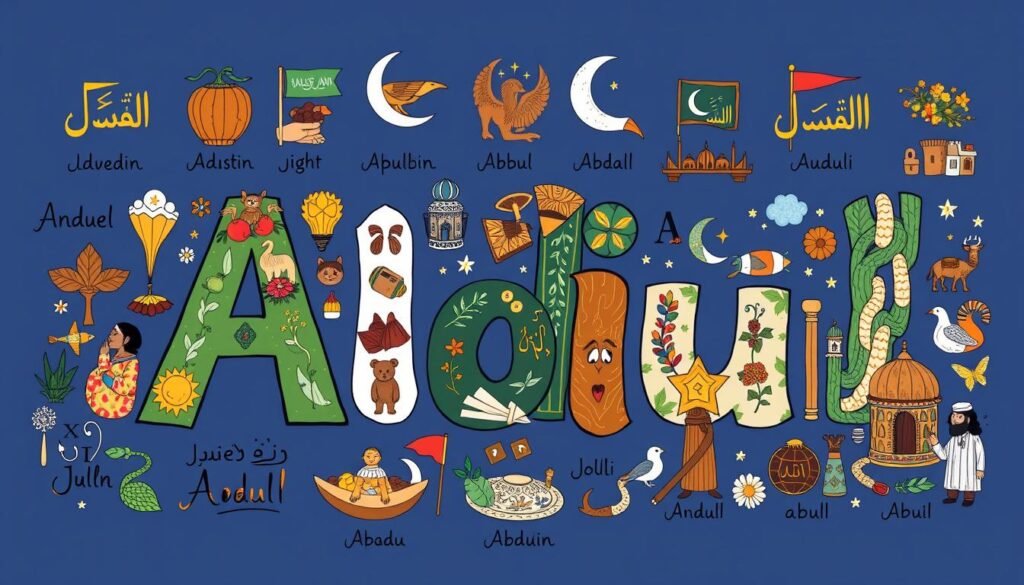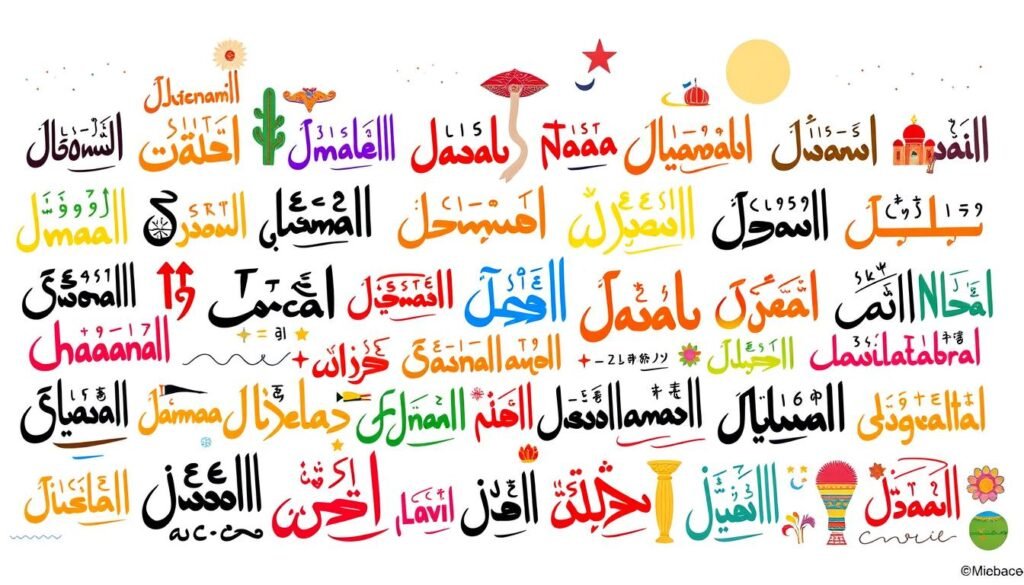Have you ever thought about the meaning of names? What do they say about who we are, our culture, and our faith? The name Abdul is a great example of this. It comes from the Arabic word “Abd,” which means “servant.” Adding “al” to it makes it “the servant.”
This name is common among males in many cultures. It raises questions about its connection to Islam and its broader cultural importance.
Understanding the Meaning of Abdul
The name Abdul is deeply meaningful in Arabic culture. It shows a strong connection to spirituality and humility. It comes from the Arabic language and means “servant of God.”
This etymology makes the name a personal identifier and a sign of religious commitment.
Origins and Etymology
The word “Abdul” comes from the Arabic word “عَبْد” (ʕabd), meaning “servant” or “slave.” It is combined with “ال” (al), which means “the.” This shows a deep relationship between people and their Creator.
The name became popular in the 7th century. This was when Islam started, focusing on serving Allah.
Cultural Significance in Arabic
In Arabic culture, Abdul holds a special place. Giving a child this name shows the family’s commitment to Islam. It shows their wish for the child to be humble and serve others.
This name reminds people of their faith. It reflects the values of Muslim societies. It is widely accepted in the Arab world and among Muslims worldwide.
The Historical Context of Abdul
The name Abdul is deeply rooted in Islamic tradition. It shows a big change with Islam’s arrival in Arabia. The prefix “Abdul,” meaning “servant of,” became common to show devotion to Allah. Names like Abdullah, meaning “Servant of God,” were popular.
This name change showed a shift in culture. People wanted to link their identity with their faith. This made the name very important in Muslim societies.
Development of the Name in Islamic Tradition
In Islamic tradition, Abdul became more important. It stood for humility and servitude to God. With Islam’s rise, many names with “Abdul” appeared.
This made “Abdul” a big part of Muslim culture. As Islam spread, using this prefix became more common. It highlighted one’s bond with Allah, adding to the name’s history.
Usage in Pre-Islamic Arabia
Before Islam, Arabia had many naming traditions. Names showed lineage or profession, with various meanings. “Abd” was used before Islam, showing its flexibility.
As Islam grew, the name’s meaning changed. It became tied to spiritual significance, not just servitude. This made it part of a larger historical story.
Is Abdul A Muslim Name?
The name Abdul is deeply rooted in Islamic tradition and culture. It is a key part of many theophoric names. These names show the person’s devotion and connection to God.
Choosing a name like Abdul is a way for many Muslims to show their faith. It’s a way to express their identity and loyalty to Islamic beliefs.
Religious Implications of the Name
Abdul is a well-known name in Muslim communities. It means ‘servant’ and is often linked with Allah’s 99 names. This makes it a special name in their culture.
In countries like Afghanistan and Pakistan, Abdul is often used alone. This is because literacy rates are lower there. But in places like Turkey, where literacy is higher, people choose from a wider range of names.
The name Abdul is more than just a name. It connects to over 100 names based on God’s attributes from the Quran. Names like Abdul Rahman or Abdul Hakim show personal traits and spiritual depth. They highlight the person’s commitment to their faith.
Common Variations and Spellings of Abdul
The name Abdul has many spellings and transliterations. These show its popularity in different cultures. Each spelling comes from how people pronounce it, based on their language.
Names like “Abdel,” “Abdil,” and “Abdul” are common. They make the name known worldwide. This makes Abdul easy to spot in many places.
Transliteration Differences Across Languages
Abdul’s transliterations change a lot, fitting into many languages. In Arabic, it’s often “عبد ال” (ʿAbd al-). This highlights its cultural significance.
Other spellings like Abdül, Abdoul, and Abdhul show how languages affect the name. These changes add to the name’s rich heritage. They also help Abdul fit well in diverse cultures.

Theophoric Names Associated with Abdul
Theophoric names carry deep meaning in many cultures, especially for names starting with Abdul. They show a strong link to Islamic teachings. Names like Abdullah mean “Servant of Allah.” Abdul Aziz means “Servant of the Almighty,” and Abdul Rahman means “Servant of the Merciful.”
These names show a deep devotion. They are very meaningful.
List of Popular Combinations
Theophoric names are very important in Islamic culture. They often come from the 99 names of Allah. Each name adds to the meaning of the combination.
These names help people feel closer to the divine. They remind us of our duty and respect for Allah every day.
Role of the 99 Names of Allah
The 99 names of Allah make names like Abdul even more special. Using these names helps us show Allah’s qualities in our lives. This is very important in the Muslim community.
These names show a strong bond between the person and their faith. They are very significant.
Global Usage of the Name Abdul
The name Abdul is used all over the world. It goes beyond its Islamic roots. It’s popular in many places, showing its appeal to different cultures.
Regions Where Abdul is Common
In the Middle East, North Africa, and South Asia, Abdul is well-known. The way it’s said and spelled changes with local languages. But it’s always popular.
In Southeast Asia, Indonesia and Malaysia also use the name. It’s also becoming popular among African Americans and Turkic people in Russia. This shows how widely the name is used.
Influence on Non-Muslim Cultures
Abdul is not just for Muslims. It’s used in non-Muslim cultures too. It shows respect in names. This shows how Abdul connects different communities.
In non-religious settings, Abdul means loyalty or devotion. It helps link different cultures while keeping its true meaning. This makes Abdul important in many cultures.
Prominent Individuals Named Abdul
The name Abdul has made a big impact on history. It is known through many famous people in different areas. This shows how important the name is in shaping cultures and societies worldwide.
Abdul Sattar Edhi is a well-known humanitarian. He worked hard to help others and inspired many. Abdul Kalam, the former President of India, also made big steps in science and technology.
Notable Figures in History
Many people named Abdul have been leaders and visionaries. Names like Abdul Hakim Sialkoti and Abdul Hakim Murad add to the name’s story. They show its wide reach across cultures and time.
These individuals have left lasting marks in their fields. They include scholars, athletes, and activists. Their work shows the name’s cultural importance.
Influence in Various Fields
Abdul is linked with excellence and hard work. People named Abdul have excelled in many areas. This includes scholars, poets, athletes, and politicians.
People like Ibrahima Abdur Rahman show the name’s global reach. It has woven itself into history. For more on the name’s meaning and history, check out this page.
Variations in Naming Conventions
In Islamic culture, names are very important. They show who we are and where we come from. Names like Abdul often come with other names, showing our hopes and faith.
This tradition comes from a deep history of cultural values. Names often highlight qualities of the divine. For example, “ʿAbd” means “worshipper,” and is often paired with God’s names, like Abdullah.
Usage as a Compound Name
Compound names are common in Muslim culture. They honor faith while keeping personal identity. These names connect us to our heritage and beliefs.
In South Asia, names like Muhammad and Abdul are often combined. This creates a lasting legacy that honors family and faith.
Common Practices in Muslim Naming
Muslim naming traditions include nasab, laqab, and kunya. These show our lineage and who we are. Nasab links us to our ancestors.
Laqab highlights a unique trait, and kunya shows our role or identity. These practices make names like Abdul meaningful. They connect us to our heritage and faith, across generations.

Gender and Cultural Associations of Abdul
The name Abdul is deeply rooted in Muslim cultures, seen mainly as a male name. It carries important meanings of strength, respect, and devotion to God. These values are key in Islamic traditions.
Predominant Male Use in Muslim Societies
In many Muslim communities, Abdul is given mostly to boys. It’s not just a name but a symbol of a role in society. The name Abdul represents masculinity and duty, shaping the identity and values of those who have it.
Abdul vs. Abdullah: Key Differences
In Arabic names, Abdul and Abdullah show big cultural and language differences. They are often talked about in Arabic naming talks. But they mean different things in Islamic tradition.
The differences between Abdul and Abdullah go beyond just how they are spelled or said. They show unique qualities in Arabic names.
Understanding Related Names
Abdul is part of names like Abdul Rahman or Abdul Aziz. It means “Servant of the Most Merciful” or “Servant of the Almighty.” This shows deep religious meaning, showing respect to Allah.
On the other hand, Abdullah means “Servant of God.” It shows a direct and strong bond with God.
These name differences are key in Arabic culture. Names show family ties, history, and religious feelings. The “Abd” prefix in many names shows a tradition of honoring God. Knowing the differences between Abdul and Abdullah helps us understand Arabic names better.
Independent Usage of Abdul Outside Arabic
The name Abdul has spread beyond its Arabic roots. It’s now found in many cultures worldwide. This shows how well it adapts in different places and ways.
Its growth means more than just a name. It’s a symbol of connection between cultures. It shows how names can bridge gaps in diverse settings.
Adoption in Diverse Cultures
In places not Arab, Abdul is seen as a unique name. This change lets people use it in their own way. It’s not tied to its old meaning anymore.
This acceptance shows Abdul’s flexibility. It’s a story of identity in our connected world.
The Future of the Name Abdul
The name Abdul looks bright for the future. It keeps its historical and cultural importance. It’s a popular choice for parents wanting to honor their heritage.
The name means serving a higher power. This shows the spiritual commitment found in many Islamic beliefs.
As the world becomes more diverse, Abdul’s appeal will grow. It blends different cultures and beliefs. This shows a shift towards accepting meaningful names in Western societies.
Abdul stays strong in Muslim communities. It’s often used to show devotion to God. This name connects people to their roots and universal values.
Those who choose Abdul celebrate their heritage. They help link cultural relevance and personal identity. For more on the name, check out this page.
FAQ
Is Abdul a Muslim name?
What is the meaning of Abdul?
What is the historical significance of Abdul?
Are there religious implications associated with the name Abdul?
What are some common variations of the name Abdul?
Can you provide examples of theophoric names associated with Abdul?
In which regions is the name Abdul commonly used?
Who are some prominent individuals named Abdul?
How is Abdul used in naming conventions?
What are the gender associations of the name Abdul?
How do Abdul and Abdullah differ?
Is Abdul used independently in non-Arabic cultures?
What does the future hold for the name Abdul?

Embracing Faith, One Insight at a Time!
The teachings of the Quran have always guided my path. With a deep passion for Islamic knowledge, I strive to blend the wisdom of tradition with the relevance of today, making the timeless messages of Islam accessible and meaningful for everyone.
Muslim Culture Hub is my platform to share historical insights and thought-provoking articles, exploring both well-known and lesser-discussed aspects of Islamic culture and beliefs. My mission is to create an inclusive online space where everyone can learn, strengthen their faith, and connect with the profound message of Islam.
Join the journey!
May peace be upon you.








